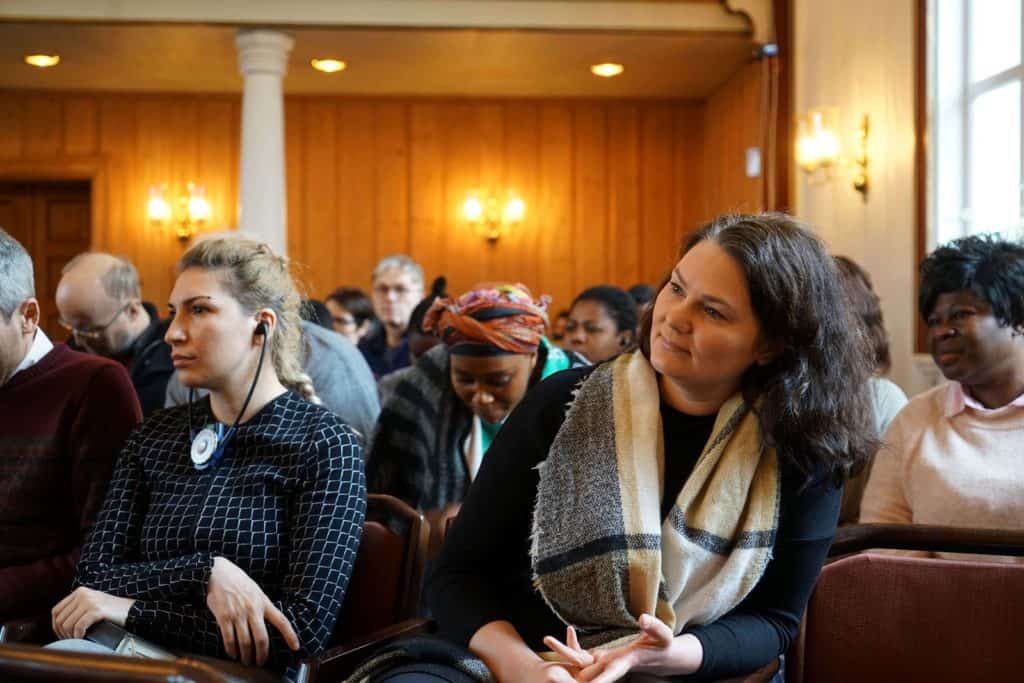
While Seventh-day Adventists and Jews are two different faith groups, they both hold fast to many of the same important biblical truths. One of these key beliefs is observing the seventh-day Sabbath.
It makes sense that this belief would make these major faith groups stand out. The majority of churchgoers around the world regard Sunday as the day for worship.
But Jews and Adventists alike uphold the original Sabbath day, celebrated on the seventh day, right after God created the world (Genesis 2:2, 3). It’s this day that the Fourth Commandment asks us to remember (Exodus 20:8-11).
That being the case, one might also wonder if Jews and Adventists celebrate the Sabbath in the same ways, even today. Do they share all the same traditions, or express their love for Sabbath with similar practices?
They certainly do. But there are some significant differences in their Sabbath practices, many of which reflect where they differ in their underlying belief structures.
Let’s take a quick look at the history of the Sabbath, and how the traditions of Sabbath-keeping originated and developed throughout history. We’ll go through:
- The very first Sabbath in Genesis
- Did Jesus change the Sabbath?
- Similarities in Sabbath-keeping
- Differences in Sabbath-keeping
- Embracing the blessing
We’ll start as far back as we can go—to the first Sabbath ever celebrated.

The very first Sabbath, established by God at creation
God blessed the seventh day long before any of the other major events the Bible. (Though it wasn’t named “Sabbath” until Exodus 16:23.)
You might find, however, that it’s not uncommon for someone to hear about Sabbath-keeping Christians and then remark something like, “but isn’t that the old Jewish Sabbath?”
It’s an interesting question. Yes, the seventh-day Sabbath is very old—as old as the creation week.
Genesis 1 describes the six-day creation of our world. The days of creation were clearly and explicitly depicted: day one, day two, day three…up until day six.
And God saw all that He had made, and behold, it was very good. And there was evening and there was morning, the sixth day.
Genesis 1:31 (NASB)
What happened next couldn’t be clearer about the establishment of this day of rest. Right after the sixth day’s creation, we read:
So the heavens and the earth and everything in them were completed. And on the seventh day God had completed His work that He had done, and He rested on the seventh day from all His work that He had done. God blessed the seventh day and declared it holy, for on it He rested from all His work of creation.
Genesis 2:1-3 (CSB)
Here, and not at Mount Sinai (as commonly believed), do we find the origins of the seventh day being set apart as holy by God. And what’s important is that this setting apart, this blessing of the seventh day, happened long before any specific nationality of people existed.
Instead, we are back in Eden itself. Before the fall of Adam and Eve (Genesis 3), before the flood (Genesis 6-8), before the tower of Babel (Genesis 11), before Abraham (Genesis 12), and before the Exodus from Egypt (Exodus 5-12).
So yes, the Sabbath is old. But it was established for all people who would live on earth.
Of course, many Jews since antiquity have been keeping the seventh day holy, which is why it’s so often associated with them. But the very wording of the Sabbath commandment itself shows just how universal it is. The fourth commandment, which commemorates the sanctifying of the Sabbath in Eden, shows its broad nature.
Remember the sabbath day, to keep it holy. For six days you shall labor and do all your work, but the seventh day is a Sabbath of the Lord your God; on it you shall not do any work, you, or your son, or your daughter, your male slave or your female slave, or your cattle, or your resident who stays with you.
Exodus 20:8-11 (NASB)
For in six days the Lord made the heavens and the earth, the sea and everything that is in them, and He rested on the seventh day; for that reason the Lord blessed the Sabbath day and made it holy.
We are pointed back to the six-day creation of all life on earth including the first humans, the parents of all who followed. This Sabbath is about the origins of all of us.
The Jews have kept the seventh-day Sabbath longer than any other established religion or denomination, which is honorable and worth appreciating. They also helped preserve some of the ancient Sabbath traditions.
The Sabbath itself, however, is the weekly memorial toward our Creator. It was established for the benefit of every human being, allowing us to dedicate 24 hours to taking a break from work, focusing on our Creator, and enjoying the world He made for us.

But did Jesus change the Sabbath?
In every encounter Jesus had with the religious leaders over the Sabbath, the issue was never on the continued validity of the seventh-day Sabbath, as opposed to Sunday. In fact, the issue of Sabbath timing is never even mentioned in any exchanges with the Pharisees.
Jesus was actually upholding the seventh-day Sabbath as it was always supposed to be. He was clarifying how the Fourth Commandment was to be kept—as an enjoyable day of rest and gratitude. Not a day burdened by a list of rules.
For instance, when Jesus healed a man with a withered hand on the Sabbath, what did He say to the leaders who wanted to accuse Him of breaking the Sabbath?
But He said to them, ‘What man is there among you who has a sheep, and if it falls into a pit on the Sabbath, will he not take hold of it and lift it out? How much more valuable then is a person than a sheep! So then, it is lawful to do good on the Sabbath.
Matthew 12:11, 12 (NASB)
Far from abolishing the Sabbath or changing the day. Jesus was correcting the conniving religious leaders on proper Sabbath observance.
It’s the same with every Sabbath encounter in the Gospels between Jesus and the religious leaders. The issue was never about abolishing or changing the day. It was always about how it should be kept.
Jesus’ Sabbath encounters, if read for what they teach, only enhance the continued validity of the seventh-day Sabbath. This is a big part of why Seventh-day Adventists keep it.

Similarities in Sabbath observance between Jews and Adventists
No question, Adventists keep the same Sabbath day as do practicing Jews. Here are some similarities in how they do this.
Celebrating Sabbath from sunset to sunset
While many faith groups keep the seventh-day Sabbath, not all of them begin the weekly Sabbath at the same time of day. For both Jews and Adventists, they begin Sabbath at sunset on Friday night, just as they did throughout the Bible.
This means that depending on the time of year, the Sabbath could start and end at different times of the day.
Refraining from work and business on the Sabbath
Adventists and Jews alike follow the words of the Fourth Commandment that tell us to “not do any work” on the Sabbath day, as that is part of keeping it “holy.”
Just as God switched from making things to enjoying things on the first Sabbath, Adventists and Jews shift their focus each seventh day.
Attending worship services on Sabbath
Since the gift of the Sabbath provides a 24-hour period in which we don’t have to go to work, think about work, or worry about the typical mundane obligations of the weekdays, it’s the perfect opportunity to gather together and worship God.

Differences in Sabbath-keeping practices between Jews and Adventists
Several of the Sabbath-keeping differences lie within the method, rather than principle or belief.
While these practices can vary between individuals, many Jews who keep Shabbat make sure several safeguards are in place. This is to make certain the Sabbath isn’t broken, even unintentionally.
For example, when it comes to the Sabbath’s beginning at Friday sunset, some Jewish communities have a tradition of lighting Sabbath candles about 18 minutes before the sun is supposed to set.
This helps provide a “grace period” for days when the sky is cloudy and it’s harder to see when the sun sets, or to accommodate “watches and clocks set to slightly different times, ensuring that no one begins Shabbat any later than the actual sunset.”((https://www.myjewishlearning.com/article/ask-the-expert-when-does-shabbat-start/ ))
Many Orthodox Jews have also come up with creative solutions to make certain no work is done on the Sabbath. For instance, Jews that keep the Sabbath in this way will not drive to the synagogue for Sabbath services. They choose to walk instead.
And in some buildings you might find an elevator that is programmed to automatically stop on every floor on the Sabbath, because pushing buttons is considered a form of work, since the act completes an electric circuit((Halperin, Levi Y., Shabbat and Electricity )).
It’s also common for Orthodox Jews to refrain from carrying money or writing/typing on Sabbath.
The foundation of all these practices among the Orthodox is called the avot melachah, which covers 39 main categories of labor. These prohibitions include things like adding fresh water to a vase of cut flowers, applying makeup, rubbing soap to make lather, opening an umbrella, wearing eyeglasses that aren’t permanently required, and brushing mud from your shoes.
There are also some objects that Jews are discouraged from even touching on the Sabbath, such as phones, computers, flashlights, money, pens or pencils, etc. These are objects typically associated with work.
When it comes to Sabbath-keeping for Adventists, the Church does not dictate to individual members how to keep the Sabbath, at least not beyond the principles found in the Bible (see Exodus 16:29; 20:8-11; 34:21; Isaiah 58:13; Nehemiah 13:15-22). Though Adventists take the Sabbath seriously (it is, after all, one of the Ten Commandments), they focus more on the relationship aspect of what Sabbath offers.
Yes, a big part of Sabbath is about not working. But other than that, it isn’t supposed to be a list of what not to do. Ideally, it’s an opportunity to ask ourselves, How can I spend this day, now freed from many worldly tasks, to deepen my relationship with God and family or others?
Additionally, even though the ideal is that all should put aside their work for these sacred 24 hours, it’s not uncommon to find doctors, nurses, ministers, and other service or emergency personnel working simply because of safety or necessity (just like the guards in Nehemiah 13:19).
Adventists uphold that the idea behind the Sabbath is to hit the pause button on pursuing business, growing wealth, focusing on personal gain, etc. It would be best if no one would have to work on Sabbath, but there is recognition that some jobs need to keep going for the sake of the community. And for those who are bound to a workplace on Sabbath, there is still intentional effort in making the whole day special and dedicated to God.
Most Adventists are likely to put aside household chores as well, such as laundry, cleaning, yardwork, and sometimes hobby projects or non-urgent repairs.
In addition, Adventists also spread the joy of the Sabbath by trying their best not to make people around them have to work, either. The Fourth Commandment encourages us to extend this day off to our families, servants, and houseguests (Exodus 20:10).
Adventists cherish what is written in the Gospels, the words of Jesus, who is “Lord of the Sabbath” (Mark 2:28; Luke 6:5). In response to the Pharisee’s many laws for Sabbath-keeping, He said:
The Sabbath was made for man, and not man for the Sabbath.
Mark 2:27 (NASB)
God made the Sabbath for our enjoyment, our enrichment, and our growing relationship with Him.
Adventists seek to avoid working on the Sabbath. But they also don’t want it to feel it’s like hard work trying to avoid work. If the effort is made to put aside the stresses and obligations of the typical weekday so the focus can be placed on God and His creation, that’s the spirit of Sabbath.
By commanding rest, the Sabbath gives us permission to set aside our regular obligations. Then we can dedicated this time to reconnect with God and family in ways our busy schedules usually make difficult. It forms a hedge, protecting that time for our spiritual rejuvenation.
And finally, Adventists rest in the atoning and restoring work of Jesus. They know people are saved by faith, not by works (Romans 3:28, Romans 4:1-4). We follow God’s commandments as a loving, grateful response to who He is and what He has done for us. And each weekly Sabbath allows time to reflect upon this beautiful Christian truth.

Embracing the blessing
All differences aside, both Adventists and Jews appreciate the amazing gift God has given us with the Sabbath. It helps us stay close to our Creator, while taking time to enjoy all His creation.
And, instead of us having to go to it, the Sabbath comes to us. Once a week, at about one thousand miles an hour, the seventh-day Sabbath sweeps across the timelines of the globe—a memorial in time to God’s work of creating things in space.
God made the Sabbath for everyone, and everyone is invited to experience this blessing, no matter what faith group you come from.
Want to keep learning more? View our online Bible study options.
